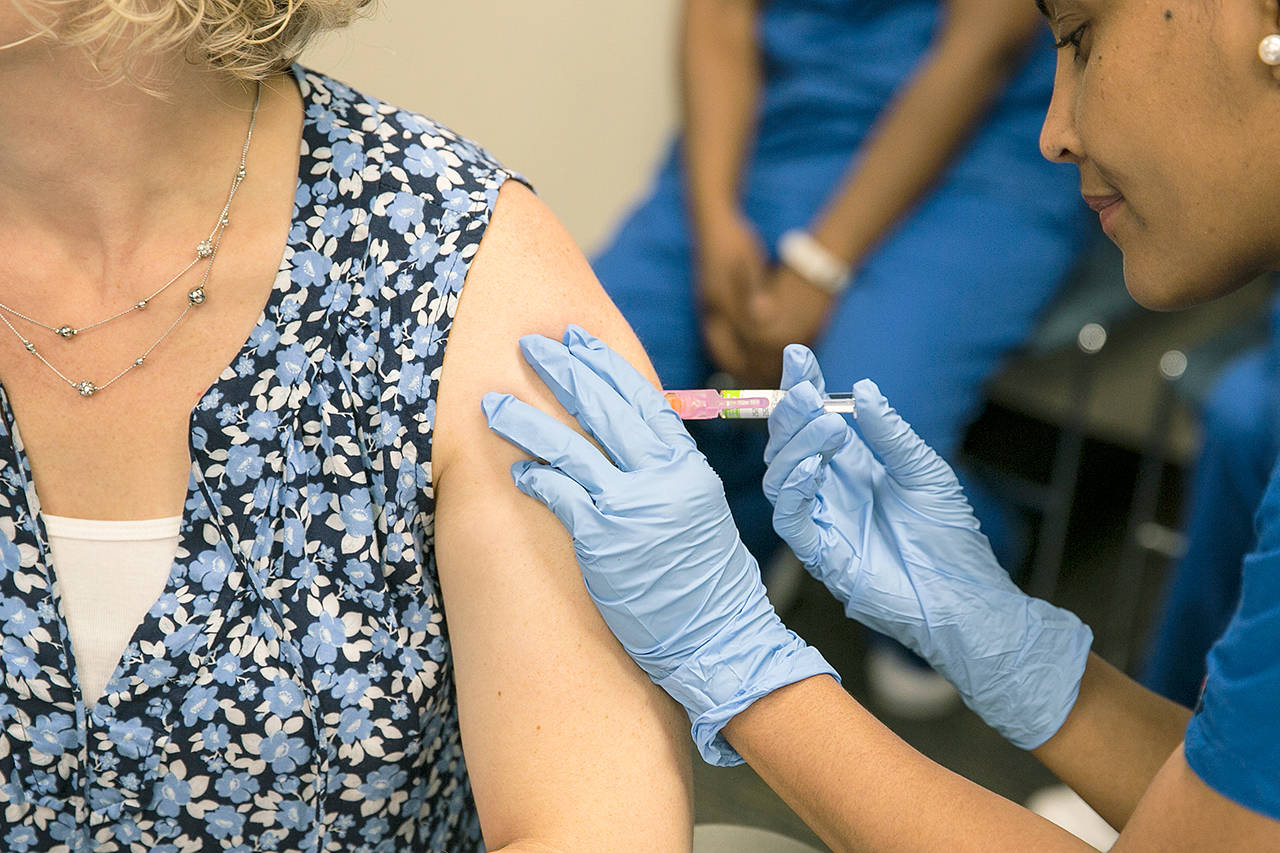By MultiCare Health System/for the Reporter
Flu activity is “elevated” in Washington state, with 15 influenza deaths reported statewide. During the 2017-18 flu season, a total of 296 people died.
A man in his 40s in Pierce County was the first flu-related death reported back in October.
The best protection against the flu virus is washing your hands regularly and getting the flu shot. If you haven’t gotten a flu shot yet, there’s still time. The flu shot is effective as long as flu viruses are circulating.
Flu activity typically peaks between December and March, but it can last as late as May.
Here’s what you need to know about navigating peak flu season.
1. Flu shots are your best protection, and it’s not too late to get one.
Flu viruses are constantly changing, so each year the vaccine is updated based on which influenza viruses are making people sick.
This year, the nasal spray flu vaccine is once again available as an alternative to the shot. It’s recommended for people ages 2-49, except for pregnant women.
The flu vaccine can reduce the risk of flu by about 50-60 percent, according to research conducted by the CDC, which studies how well the vaccine protects against the flu each year.
Traditional flu vaccines protect against three different flu viruses: two influenza A viruses and one influenza B virus.
Even when the vaccine is not a good match against circulating viruses, it can still sometimes provide protection against different (but related) viruses, says the CDC.
Everyone older than 6 months old should get the flu shot, according to the CDC. It’s especially important for those at higher risk to get vaccinated:
• Children younger than 5 but especially younger than 2
• Adults 65 and older
• Pregnant women
• Residents of nursing homes and other long-term care facilities
• Native Americans
• People with certain medical conditions
2. You can take additional steps to avoid the flu.
We know washing our hands is one of the most effective steps against illnesses such as the flu, but what else can you do?
• Avoid crowded places and close contact with people who are sick
• Cover your nose and mouth when you cough or sneeze
• Avoid touching your eyes and nose, as this is how flu viruses spread
3. If you get sick, you can take steps to feel better.
Taking these steps is not a guarantee, of course. The key to getting better is to stay home and rest. In addition:
• Avoid close contact with family members so you don’t pass on the illness
• Drink plenty of fluids — dehydration is a serious complication in flu patients
• You can treat fever and cough with over-the-counter medications for comfort
• If you have a flu-like illness, try to stay home for at least 24 hours after your fever is gone (unless you need to receive care)
4. If symptoms don’t improve, see your doctor.
If you experience a cough, fever or other flu symptoms that worsen or don’t improve, this is the time to see your doctor.
The same goes if you are pregnant, over age 65, or otherwise at high risk of flu-related complications.
Difficulty breathing, inability to drink enough fluids and irritability in children are some of the more serious signs of a significant influenza infection, which can lead to complications.
5. You have several options when it comes to getting a flu shot.
Pharmacies that offer the flu shot typically accept most forms of insurance, but be sure to let your primary care doctor know you received your flu shot so it can be added to your record.
Make an appointment with your primary care provider, pediatric provider, or visit one of our walk-in clinics:
• MultiCare Urgent Care — vaccines for patients 19 years and older
• Mary Bridge Pediatric Urgent Care — vaccines for ages 6 months to 18 years
• Immediate Clinic — vaccines for patients 9 years and older
• MultiCare Indigo Urgent Care clinics — vaccines for patients 19 and older
Day-to-day availability for flu shots may vary depending on demand, so call ahead to confirm before you go.
MultiCare Health System is a not-for-profit health care organization with more than 18,000 employees, providers and volunteers.


